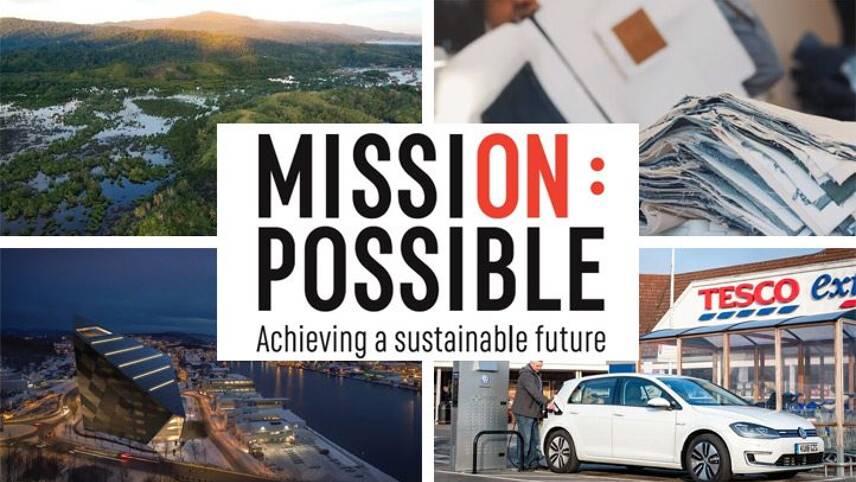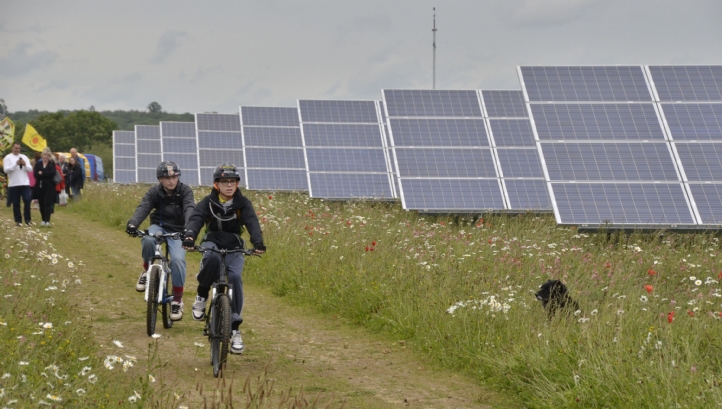Register for free and continue reading
Join our growing army of changemakers and get unlimited access to our premium content

Each of these success stories exemplifies how businesses are ramping up ambitions and actions in all areas of sustainable development
Published every week, the new series charts how businesses and sustainability professionals are working to achieve their ‘Mission Possible’ across the campaign’s five key pillars – energy, resources, infrastructure, mobility and business leadership.
From a new scheme aimed at supporting community-owned renewable power generation, to the expansion of a vehicle charging network hosted by Tesco and Volkswagen, each of these projects and initiatives is empowering businesses to play their part in achieving a sustainable future, today.
ENERGY: New ‘matchmaker’ service for community energy launched
2019 has been a tough year for community energy, with the government’s decision to axe the Feed-In Tariff (FiT) scheme and Ofgem’s Targeted Charging Review (TCR) both making it more challenging for community groups to achieve buy-in for small-scale renewable energy projects.
But 2020 might well be brighter, after non-profit Forum For the Future teamed up with National Grid, People’s Postcode Lottery and Friends Provident Foundation to launch an online platform which pairs energy assets with communities and investors. Called PowerPaired, the platform enables organisations which host – or are looking to host – renewable generation projects with community groups keen to co-own them. Asset owners signed up to date include National Grid, Oldham Council, Suffolk County Council, Aster Homes and St Mungo’s Charity.
“There are currently over 100 assets from across the country on the platform – from offices and industrial estates to schools, churches, libraries and homeless shelters,” Forum for the Future’s PowerPaired project lead Rebecca Lawson said.“Successful projects will help communities take control of their energy, save money and tackle the climate crisis – all at the same time.”
The launch of PowerPaired comes in the same week that a subsidiary of Swindon Borough Council submitted plans to build a subsidy-free community solar farm at the Duke of Gloucester Barracks in Gloucestershire.
RESOURCES: Levi Strauss launches recycled denim bags in aid of charity
Fashion is one of the largest contributors to the global economy – but also one of the world’s leading causes of waste. According to the Ellen MacArthur Foundation, the equivalent of one bin lorry full of post-consumer clothing is landfilled or burned every second – and that’s before supply chain waste is accounted for.
In a drive to minimise its contribution to fashion’s waste mountain while also championing social sustainability, Levi Strauss has partnered with designer Rita Cassetta and Italian social enterprise Porto Alegre to create a range of bags made using denim offcuts. The bags are being made by vulnerable people including refugees and those dealing with long-term health problems, who receive a premium for their work. They will be sold through Levi’s European stores and on its website, with all net proceeds going back to Porto Alegre.
“At Levi Strauss & Co., we’ve always believed that how we make our products is just as important as what we make,” Levi’s senior director of eCommerce Adele Ballotta said. “The Levi’s x Porto Alegre collection is an example of that belief and of our commitment to being a force for positive change in our communities.”
MOBILITY: VW and Tesco powering ahead with EV charging rollout
Late last year, Tesco inked a partnership with Volkswagen (VW) that will see more than 2,400 electric vehicle (EV) charging bays across the supermarket’s portfolio of stores by the end of 2021. Crucially, the charging points – designed, installed and managed by Pod Point – provide free charging to VW owners
VW this week posted an update on the project, revealing that more than 100 Tesco stores now play host to EV charging points. This network of chargers was used more than 12,000 times in November, providing almost 600,000 kWh of energy to motorists. VW claims this amount of energy is enough to provide 250,000 miles to an e-Golf.
In a bid to make these statistics more digestible for individuals, VW has created a calculator which lets shoppers know how many free miles per year they could get from charging their EV at Tesco. The tool estimates that those who do a weekly Tesco shop of 50 minutes or more would receive 1,170 miles of range for free.
“We are really pleased to help break down any remaining barriers to opting for an electric car,” VW UK’s head of marketing Geraldine Ingham said. “This fantastic partnership with Tesco and Pod Point makes choosing an electric car even more attractive, allowing people to charge for free, all while going about their daily business.”
THE BUILT ENVIRONMENT: Snøhetta targets ‘carbon-negative’ buildings portfolio
While carbon neutrality or net-zero is the ambition of many companies within the built environment sector and beyond, some firms are now striving to go one step further and create net ‘carbon-negative’ products which either generate more energy than they consume or sequester more carbon than they emit.
Norwegian architect Snøhetta this week joined that cohort of businesses, pledging to deliver an entirely ‘net-negative’ portfolio of buildings within the next 20 years. The business will, first of all, work to ensure that all projects designed within the next ten years are carbon neutral. It will then work to develop buildings which are carbon-negative in terms of both their operations and the materials used to erect them, by ensuring that they generate enough renewable energy to compensate for emissions across their life-cycle. Snøhetta’s current visualisations for such buildings heavily incorporate modern solar panels.
According to Snøhetta’s co-founder Kjetil Thorsten, buildings would need to operate for around 60 years before they generate enough power to become net-negative, if they were fitted with today’s solar technology.
BUSINESS LEADERSHIP: PayByPhone to plant trees for transactions
With man-made carbon capture, usage and storage (CCUS) technologies still in their relative infancy, many governments and businesses are turning to nature-based solutions to help reduce the world’s net emissions in a way which also champions biodiversity. Indeed, all major UK political parties have included tree planting in their general election manifestos.
Another success story in this space comes from mobile parking payment provider PayByPhone, which this week announced a new partnership with Eden Reforestation Projects. Under the month-long partnership, the company will plant one tree in Madagascar for every 100 transactions made. PayByPhone is aiming to plant 30,000 trees in this way by the end of 2019 and has said it will also help Eden with its mission to provide villagers with food and medicine. Madagascar was chosen as it is estimated that 90% of the island’s original forests have been destroyed to date.
“This is not just another well-meaning green initiative aimed at getting drivers to engage with environmental issues,” PayByPhone’s UK chief executive Jonny Combe said.
“Today, motorists want to travel in a more sustainable way, to choose services and to support initiatives that enable them to improve their own environmental impact, however large or small that may be. With this partnership, motorists can directly combat climate change just by going through their daily life. Planting trees will make an impact on the environment globally, and locally, helping the lives of many developing communities.”
Sarah George






Please login or Register to leave a comment.